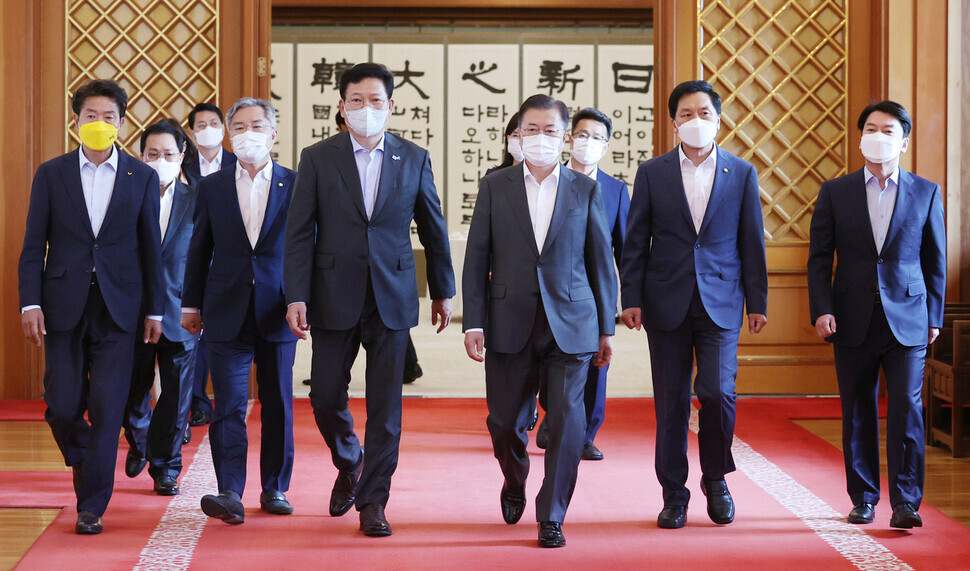hankyoreh
Links to other country sites 다른 나라 사이트 링크
Moon says large-scale face-to-face S. Korea-US military exercise is unlikely

South Korean President Moon Jae-in said Wednesday that conditions with the COVID-19 pandemic prevent “large numbers of troops training face-to-face as in the past” during joint South Korea-US military exercises scheduled for this August.
“The dates, methods and level of the joint exercise will be decided carefully at a later date,” he added.
His remarks came at a luncheon with leaders of the five main political parties at the Blue House that day, in response to a suggestion from Justice Party leader Yeo Yeong-gug that an announcement of South Korea’s willingness to cancel or postpone the exercises could “help get the ball rolling” with inter-Korean dialogue.
When Song Young-gil, head of the Democratic Party, and Choe Kang-wook, leader of the Open Democratic Party, lamented the current timeframe of the transfer of wartime operational control (OPCON) of the South Korean military, which depends on several conditions, Moon acknowledged that some parts of the timeframe were not ideal.
“However, we need to recognize that it’s our responsibility to recover OPCON. We will continue dialogue and review to bring those conditions to fruition,” Moon said.
“We ought to bear in mind that we’ve asked for delays in the past,” he added.
Moon was referring to the fact that previous South Korean Presidents Lee Myung-bak and Park Geun-hye had asked the US to make the OPCON transfer conditional, arguing that the April 17, 2012 timeframe reached by the two countries’ top defense officials in 2007, during the presidency of Roh Moo-hyun, was premature.
When People’s Party leader Ahn Cheol-soo asked about relations with China, including plans for a meeting with Chinese President Xi Jinping, Moon said that “the timing hasn’t been confirmed yet” but that South Korea would “work to arrange Xi’s visit to South Korea once the COVID-19 situation has been stabilized.”
The leaders of the ruling and opposition parties offered opinions about a range of policy issues, including retroactive compensation for small business owners, attempts to rein in the real estate market, the shift away from nuclear power, and measures to prosecute companies for serious industrial accidents.
Rather than specifically answering individual questions, Moon proposed holding talks between the government and the ruling and opposition parties every three months to enable dialogue to continue.
Moon organized the luncheon to explain the results of his summit with US President Joe Biden to the leaders of South Korea’s major parties. The luncheon was attended by Song Young-gil, leader of the Democratic Party; Kim Gi-hyeon, acting leader of the People Power Party; Yeo Yeong-gug, leader of the Justice Party; Ahn Cheol-soo, leader of the People’s Party; and Choe Kang-wook, leader of the Open Democratic Party.
By Song Chae Kyung-hwa, staff reporter
Please direct comments or questions to [english@hani.co.kr]

Editorial・opinion
![[Editorial] Perilous stakes of Trump’s rhetoric around US troop pullout from Korea [Editorial] Perilous stakes of Trump’s rhetoric around US troop pullout from Korea](https://flexible.img.hani.co.kr/flexible/normal/500/300/imgdb/original/2024/0509/221715238827911.jpg) [Editorial] Perilous stakes of Trump’s rhetoric around US troop pullout from Korea
[Editorial] Perilous stakes of Trump’s rhetoric around US troop pullout from Korea![[Guest essay] Preventing Korean Peninsula from becoming front line of new cold war [Guest essay] Preventing Korean Peninsula from becoming front line of new cold war](https://flexible.img.hani.co.kr/flexible/normal/500/300/imgdb/original/2024/0507/7217150679227807.jpg) [Guest essay] Preventing Korean Peninsula from becoming front line of new cold war
[Guest essay] Preventing Korean Peninsula from becoming front line of new cold war- [Column] The state is back — but is it in business?
- [Column] Life on our Trisolaris
- [Editorial] Penalties for airing allegations against Korea’s first lady endanger free press
- [Editorial] Yoon must halt procurement of SM-3 interceptor missiles
- [Guest essay] Maybe Korea’s rapid population decline is an opportunity, not a crisis
- [Column] Can Yoon steer diplomacy with Russia, China back on track?
- [Column] Season 2 of special prosecutor probe may be coming to Korea soon
- [Column] Park Geun-hye déjà vu in Yoon Suk-yeol
Most viewed articles
- 1Behind-the-times gender change regulations leave trans Koreans in the lurch
- 260% of young Koreans see no need to have kids after marriage
- 3Family that exposed military cover-up of loved one’s death reflect on Marine’s death
- 4[Guest essay] Preventing Korean Peninsula from becoming front line of new cold war
- 5Yoon’s revival of civil affairs senior secretary criticized as shield against judicial scrutiny
- 6Japan says its directives were aimed at increasing Line’s security, not pushing Naver buyout
- 7‘Free Palestine!’: Anti-war protest wave comes to Korean campuses
- 8Korean president’s jailed mother-in-law approved for parole
- 9S. Korean first lady likely to face questioning by prosecutors over Dior handbag scandal
- 10Marines who survived flood that killed colleague urge president to OK special counsel probe